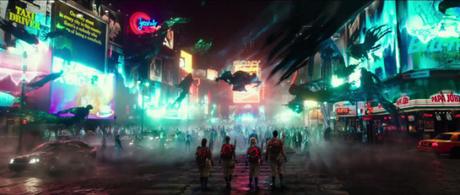
Over the past couple of days, as industry trades like Variety, The Hollywood Reporter and Deadline have dutifully relayed weekend box office updates they've repeatedly referred to Sony's Ghostbusters reboot as "the most talked about film of the summer." It's going to make a mere fraction of the money of mega-blockbusters like Captain America: Civil War, Finding Dory and The Secret Life of Pets, yet by the end of the summer no film will have inspired more think pieces and hand-wringing than Ghostbusters.
But why is that? What exactly is it about Ghostbusters which has sent the internet into a tizzy for solid year at this point, and continues to so severely divide audiences (e.g., I didn't really like it, but s everal bloggers I follow loved it)? It can't just be about gender. This is not a simple binary whereby those people who've rejected this movie are all asshole sexists, and everyone who has embraced it are enlightened feminists. No, there are multiple legitimate arguments to be made against as well as for Ghostbusters which have nothing to do with gender. In fact, if you step back from it the reason Ghostbusters has been an online lighting rod since before it even had a script is because it is such a perfect storm of everything zeitgeisty in film commentary at the moment.
1. There's a black character who seems too stereotypical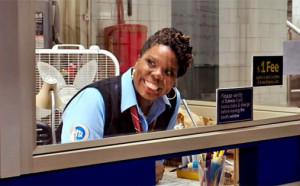 As of this writing, cops are being mourned in Baton Rouge, as those fed up with the recent run of cops killing black men have taken to targeting white cops, first in Dallas, now in Baton Rouge. On Thursday, President Obama conducted an hour-long, commercial free town hall meeting addressing the state of race relations in the country, but the long simmering tensions cannot be so easily quelled.
As of this writing, cops are being mourned in Baton Rouge, as those fed up with the recent run of cops killing black men have taken to targeting white cops, first in Dallas, now in Baton Rouge. On Thursday, President Obama conducted an hour-long, commercial free town hall meeting addressing the state of race relations in the country, but the long simmering tensions cannot be so easily quelled.
To put it simply, there are more important things going on right now with race relations in America than Leslie Jones' potentially racially insensitive Ghostbusters character Patty Tolan. However, from the moment the first trailer debuted Jones came under fire for, as Fusion put it, "hollering, bitch-slapping, using the actual phrase 'AWW HELL NAH,' and generally creating the kind of minstrel show we should have transcended by now."
Not surprisingly, now that we've seen the actual film we know it's not quite as cut and dry as that. Patty does all of those things, but she's more sweet than stereotypically sassy and her deep knowledge about the history of New York proves quite handy. She certainly has more shading than her black counterpart in the original Ghostbusters, Ernie Hudson's Winston Zeddemore, ever receive.
Still, her more boisterous moments unwittingly tapped into the ongoing frustration over the lack of dynamic representation for black characters in Hollywood movies. As NerdsOfColor argued, "Is this the 1980s? Leslie even had a Cadillac hearse joke. Really? This joke was done much better, nineteen years ago, by Bill Bellamy in Love Jones."
In short, Ghostbusters gave the world another black Ghostbuster and called it progress, and the world said back, "We've seen this show before. Give us something more interesting." And that's before you get into whether or not they would have been better making her a scientist instead of a blue collar voice of the street.
2. There's a gay character who's not allowed to be gay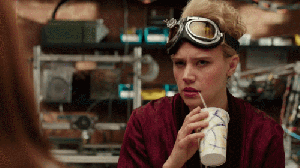 "You come here often," is Kate McKinnon's first line of the movie, and it kicks off what is essentially a movie-long series of flirtations thrown Erin Gilbert's (Kristen Wiig) way by McKinnon's breakout character Jillian Holtzman. Of course, you need not necessarily take Holtzman's greeting as a definite pick-up attempt, mostly because Holtzman is so consistently difficult to read or predict that it's difficult to assign much of anything to her with any degree of certainty. Mostly, you just know she's really funny, in that "I have no idea what she'll do next" kind of way. Plus, just about everything seems to turn Holtzman on, making her seem more pansexual than anything else.
"You come here often," is Kate McKinnon's first line of the movie, and it kicks off what is essentially a movie-long series of flirtations thrown Erin Gilbert's (Kristen Wiig) way by McKinnon's breakout character Jillian Holtzman. Of course, you need not necessarily take Holtzman's greeting as a definite pick-up attempt, mostly because Holtzman is so consistently difficult to read or predict that it's difficult to assign much of anything to her with any degree of certainty. Mostly, you just know she's really funny, in that "I have no idea what she'll do next" kind of way. Plus, just about everything seems to turn Holtzman on, making her seem more pansexual than anything else.
Still, Holtzman's flirtations with Gilbert are the closest thing this film has to romance, other than Gilbert's own obsession with Chris Hemsworth's dimwitted Kevin. Holtzman spends the whole film throwing serious game at Gilbert who in turn spends the whole film hung up on Kevin. In both cases, whatever attraction is there does not appear to be mutual, but are we reading too much into it? Holtzman dancing to DeBarge's "Rhythm of the Night" while a confused and increasingly nervous Gilbert looks on might have nothing to do with seduction and everything to do with Holtzman simply wanting to dance in that moment.
Luckily, The Daily Beast took this straight to Paul Feig, and his non-answer spoke volumes, as summarized by Vulture:
Asked point-blank if McKinnon, herself gay, is playing a gay character in the reboot, Feig responded, "What do you think?" When [Daily Beast's Jen Yamato] said she thought Holtzmann was indeed gay, Feig gave a "silent nod" and explained: "I hate to be coy about it ... But when you're dealing with the studios and that kind of thing ... "
He then added, "You know, Kate is who she is and I love the relationship between Kate and Melissa's characters. ... I wasn't like, 'And now you should wink at them.' This is stuff that is coming out of Kate! That's why you connect with those characters. They're playing versions of themselves."
This comes in the same summer in which a climactic moment in Independence Day: Resurgence hinges upon one of the male heroes seeking vengeance for his departed, long time same-sex partner, and matter-of-fact moments in Stark Trek Beyond reveal that not only is John Cho's Sulu gay but he also has a husband and child. By Hollywood blockbuster standards, that's a lot of progress in one summer, and the mere hint of Holtzman being gay in Ghostbusters is a welcome surprise.
However, earlier this year multiple TV shows killed off beloved gay characters in the span of a few weeks, kicking off a discussion about the " Bury Your Gays" trope. Even so, there are at least more gay characters on TV than ever before, thanks mostly to cable and streaming, but it can always be better.
Film should be so lucky. GLAAD's most recent assessment of gay characters in films released by the seven major studios found a historical low percentage of positive representation, leading the agency to champion the hashtag #HollywoodMustDoBetter.
Into this environment comes Ghostbusters, with a director who cannot confirm his lead character's sexuality for fear of upsetting his corporate bosses.
3. It's yet another reboot/sequel/revival/"requel" from the Hollywood dream machine which is coasting on far too many old dreams these days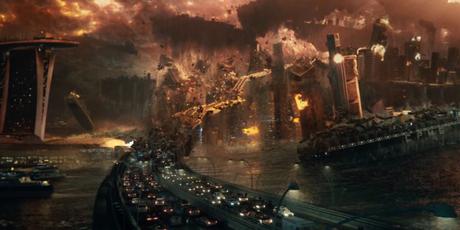 Thus far, this has been the summer of sequels no one asked for ( Now You See Me 2, Neighbors 2, TMNT: Out of the Shadows, The Huntsman: Winter's War, Alice Through the Looking Glass and Independence Day: Resurgence), and it remains to be seen how well Star Trek Beyond and Jason Bourne will fare.
Thus far, this has been the summer of sequels no one asked for ( Now You See Me 2, Neighbors 2, TMNT: Out of the Shadows, The Huntsman: Winter's War, Alice Through the Looking Glass and Independence Day: Resurgence), and it remains to be seen how well Star Trek Beyond and Jason Bourne will fare.
Technically, Ghostbusters is something different. It's a reboot, not connected to the universe of the earlier films. However, in its finale the new Ghostbusters do battle with a giant version of the iconic Ghostbusters logo, which is the perfect embodiment of just how much this reboot is dogged down by franchise legacy. It certainly screeches to a halt with each new cameo, giving the impression of a film caught between wanting to do something new while also honoring the past.
Moreover, the mere existence of this film feeds into the ongoing narrative that an increasingly risk-averse and foreign market-dependent Hollywood has simply run out of ideas. For example, back in the 80s Dan Aykroyd was partially inspired to create Ghostbusters by his lifelong fascination with the occult as well as his love for the old Abbot & Costello horror comedies. However, he was allowed to create something new. He didn't have to reboot Abbot & Costello.
For his part, Paul Feig genuinely wanted to make a horror comedy, but he couldn't do it unless it was a Ghostbusters reboot. Ergo, there's something seriously wrong with the way Hollywood greenlights its big movies these days.
When asked about his opinion of the "Hollywood has run out of ideas" argument, Feig told DenOfGeek:
It's a very easy thing to say, and I'm not going to defend Hollywood. Hollywood has got tons of problems. And in segments of Hollywood, there is a lack of originality. I can't suddenly sit here and go there's not. But to me, by rebooting this, at least I'm trying to be more original than not. But I cannot defend that I took a pre-existing giant property and rebooted it. It was just too appealing for me.
He went on to explain that Sony was going to make a new Ghostbusters eventually:
4. Thanks to the Sony hack, we know Paul Feig didn't initially want to make this movie, and then tried to keep Ivan Reitman completely out of itAll I can say is that it's been sitting there. They've been trying to make it forever. Sony was definitely going to make it. They were going to find somebody to do it. I kind of went, I have this idea, I have energy for it. I see this.
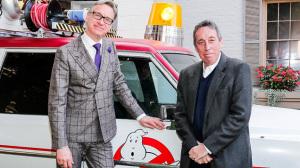 The Sony hack offered a truly unprecedented glimpse into the behind the scenes, ever day reality of a Hollywood studio, and in the case of Ghostbusters it allowed the film's biggest critics to use the words of people like Amy Pascal and Paul Feig against them. Out there for the world to read were emails in which Feig turned down the project. Then later after he changed his mind he lobbied to keep Ivan Reitman completely away from the project, and appeared to throw out some terrible ideas, such as there maybe being ghosts of aliens.
The Sony hack offered a truly unprecedented glimpse into the behind the scenes, ever day reality of a Hollywood studio, and in the case of Ghostbusters it allowed the film's biggest critics to use the words of people like Amy Pascal and Paul Feig against them. Out there for the world to read were emails in which Feig turned down the project. Then later after he changed his mind he lobbied to keep Ivan Reitman completely away from the project, and appeared to throw out some terrible ideas, such as there maybe being ghosts of aliens.
Guess what, though? He only turned it down because any sensible person would. He wanted nothing to do with making a sequel which would hand off the baton to a younger generation. You would always crumble under the weight of what came before. However, if he could start over, and make the Ghostbusters female that seemed like a new enough angle, one worth exploring. Moreover, he simply wanted Reitman's influence minimized for the same reason J.J. Abrams benefited from not having George Lucas around on The Force Awakens set: By not having the prior creator around gumming up the works it allows you the freedom to make your own thing. Of course, Reitman was on set on occasion, and acted as a producer. They clearly figured out how to work together.
As for the alien ghosts, not all early ideas are going to be winners. Just look at what people say about Dan Aykroyd's insane, 80-page treatment for the original Ghostbusters before.
5. And, yeah, some people are just super sexistThe less said the better. You could reject the new Ghostbusters on concept alone for so many reasons, perhaps arguing a co-ed squad would be more progressive than the all-female one. You could also applaud and embrace it in light of Hollywood's chronic unrepresentation of women on film. However, for some people it simply came down to "Ain't no bitches gonna hunt no ghosts," as the film jokes at one point.
There are various other ongoing conversations which Ghostbusters tapped into, such as the role of nostalgia in pop culture and our annoyance with Hollywood's over-reliance on CGI. However, Ghostbusters ultimately found itself in the eye of the storm. Too progressive for some; not nearly progressive enough for others. Perfectly hilarious for younger viewers; not funny enough for older viewers. A noble attempt to make the most interesting new Ghostbusters movie possible that somehow became the symbol for everything wrong with the state of Hollywood blockbuster filmmaking.
But, seriously, have you seen Kate McKinnon in this movie? I didn't even like the movie, but I might see it again just to see her crazy eyes.

